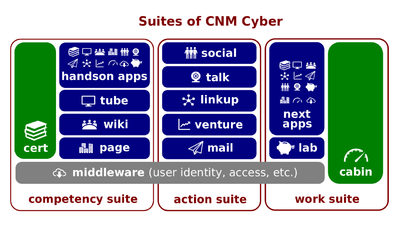|
|
| (14 intermediate revisions by the same user not shown) |
| Line 1: |
Line 1: |
| − | ===Labor Regulations===
| + | [[File:Cnm-digital.png|400px|thumb|right|[[CNMCyber suite]]s]]The [[Labor Regulations]] (hereinafter, the ''Lesson'') is the [[lesson]] of [[CNMCyber]] that introduces its participants to [[labor law]]s and related [[regulatory compliance]]. The ''Lesson'' belongs to the '''[[Introduction to Employment]]''' session of [[EmployableU Concepts]]. |
| − | :''Main wikipage: [[Labor Regulations]]''
| |
| | | | |
| − | :'''[[Labor law]]''' ([[Labor law|labour law]], [[Labor law|employment law]]). A set of government rules that regulate relationships between [[employee]]s, [[employer]]s, trade unions and the government. Government agencies usually enforce that set of laws.<div style="background-color:#efefef; padding: 5px; margin: 15px;">
| + | The ''Lesson'' is made up of three [[lectio]]s. At [[CNMCyber]], the word, [[lectio]], is used for a lesson part. |
| − | :*'''[[National Labor Relations Act]]''' ([[National Labor Relations Act|Wagner Act]]). The cornerstone of the [[United States]] federal [[labor law]]. The act was the first in history to give most [[private sector|private-sector]] [[employee]]s the right to organize into unions, to bargain collectively with employers, to define unfair labor practices by employers, and to create the [[NLRB]].
| |
| − | :*'''[[Fair Labor Standards Act]]''' ([[Fair Labor Standards Act|FLSA]]). The [[labor law]] that requires employers to pay covered employees at least the federal minimum wage and overtime pay of one-and-one-half-times the regular rate of pay for work exceeding a 40-hour week.
| |
| − | :*'''[[Civil Rights Act]]'''. The federal law that established the [[Equal Employment Opportunity Commission]] ([[EEOC]]).
| |
| − | :*'''[[Occupational Safety and Health Act]]''' ([[Occupational Safety and Health Act|OSH Act]]). The [[labor law]] that encourages safer workplace conditions in the [[United States]]. This law established the federal [[Occupational Safety and Health Administration]] ([[OSHA]]) to set standards and perform inspections at job sites. In some states, an OSHA-approved state agency helps enforce job safety standards, which must be at least as stringent as federal guidelines.
| |
| − | :*'''[[Americans with Disabilities Act]]''' ([[ADA]]). Passed by the [[United States Congress]] and signed by President George H.W. Bush in 1990, this [[labor law]] is the nation's first comprehensive civil rights law addressing the needs of people with disabilities, prohibiting discrimination in employment, public services, public accommodations, and telecommunications.
| |
| − | :*'''[[Family and Medical Leave Act]]''' ([[FMLA]]). Passed by the [[United States Congress]] and signed by President Bill Clinton in 1993, this [[labor law]] affords eligible employees up to 12 weeks of unpaid leave per year if they decide to stay home in the wake of their child's birth or adoption, or serious personal or family member illness. The law only applies to businesses that employ at least 50 employees within a 75-mile radius. To receive FMLA benefits, an employee must have been with the employer for at least one year and worked at least 1,250 hours during the past 12 months.</div>
| |
| | | | |
| − | :'''[[Whistleblower]]'''. A person who exposes secretive information or activity that is deemed illegal or unethical. In some countries, [[labor law]]s protect [[whistleblower]]s from potential retaliation that may otherwise include termination of employment, demotion, suspension, threats or harassment, and discrimination.<div style="background-color:#efefef; padding: 5px; margin: 15px;">
| |
| − | :*'''[[OSHA's Whistleblower Protection Program]]'''. The main application that is responsible for protecting the rights of employees, who may fear job loss or other reprisals if they speak up. Workers who feel they have suffered retribution for reporting company violations should file a complaint with their local OSHA office within 30 days of the incident.
| |
| − | :*'''[[Whistleblower Protection Act]]'''. The federal [[labor law]] that was initially enacted in 1989 and enhanced in 2012 that specifically protects those people who work for the [[United States Federal Government]] and report on illegal or improper activities conducted by this government or its parts.</div>
| |
| | | | |
| − | ''[[Introduction to Recruitment]] is the successor session.'' | + | ==Summaries== |
| | + | ===Predecessor=== |
| | + | :The predecessor lesson is [[Nature of Work]]. |
| | + | |
| | + | ===Outline=== |
| | + | :{|class="wikitable" width=100% style="text-align:center;" |
| | + | |+[[Labor Regulations]] |
| | + | |width=25%|[[Lectio]]s |
| | + | !#!!Referred topics |
| | + | |- |
| | + | ![[Labor Laws]] |
| | + | |1||[[Labor law]] ([[employment law]]), [[National Labor Relations Act]] ([[National Labor Relations Act|Wagner Act]]), [[Fair Labor Standards Act]] ([[Fair Labor Standards Act|FLSA]]), [[Occupational Safety and Health Act]] ([[Occupational Safety and Health Act|OSH Act]]), [[Family and Medical Leave Act]] ([[FMLA]]) |
| | + | |- |
| | + | ![[Protected Groups]] |
| | + | |2||[[Protected group]], [[Civil Rights Act]], [[Age Discrimination in Employment Act]], [[Americans with Disabilities Act]] ([[ADA]]) |
| | + | |- |
| | + | ![[Who Whistleblower Is]] |
| | + | |3||[[Whistleblower]], [[OSHA's Whistleblower Protection Program]], [[Whistleblower Protection Act]] |
| | + | |} |
| | + | |
| | + | ===Successor=== |
| | + | :The successor lesson is [[Recruitment Essentials]]. |
| | + | |
| | + | ==See also== |
| | + | [[Category: Orientation Curriculum]][[Category:Presentations]] |
